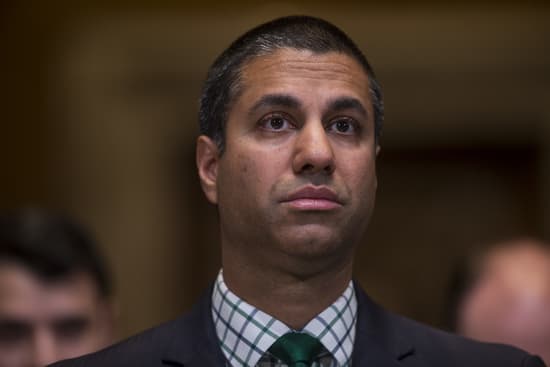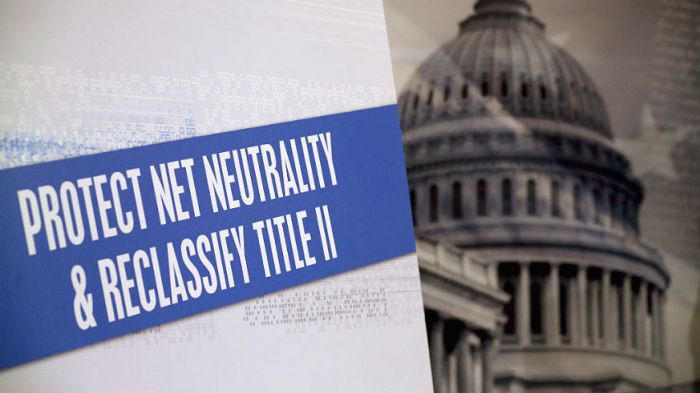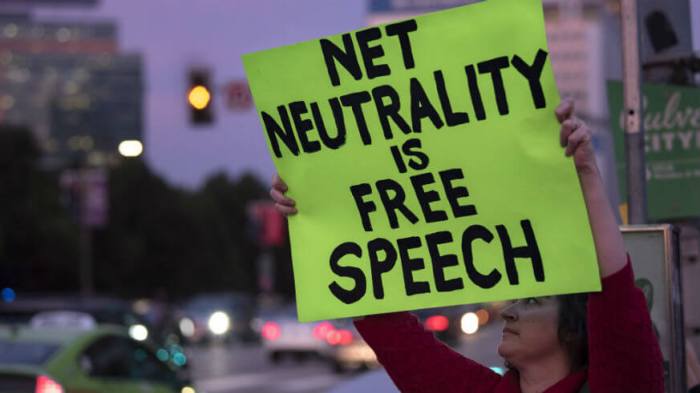As of Thursday morning, December 14, the FCC is sticking to their plan to hold the net neutrality vote later today.
Maybe you’ve seen your friends or people in your social media feeds freaking out about net neutrality and posting photos and text about #BreakTheInternet. Maybe it still seems somewhat abstract to you. After all, how are you, a humble human and Internet user, really going to be affected by the net neutrality vote?
Metro US talked exclusively with Steve Weisman, senior lecturer in law, taxation and financial planning at Bentley University who teaches about net neutrality extensively in his Media Law class. He tackled some of our (frustratingly simple) questions on the matter, and his answers just might make you care about an issue that seemed a little too technical before.
Metro US: Will we have service provider options or will it be like choosing the best of the worst?
SW: There rarely is anything “fine” in “fine print.” Internet service provider contracts are pretty much unreadable, but the good news is that you won’t have too many choices to compare. The bad news is that many people already have little or no choice in regard to internet service providers – and therein lies the problem. With little, if any, competition, the ISPs pretty much can do what they want and offer the packages they want.
Metro: Uh oh. We’ve read that services like Netflix could be intensified to make deals with one ISP. Does that mean we could have to pick and choose which of our favorite services we have access to or have to shell out for more than one?
SW: We well could see ISPs making individual deals with specific providers leaving consumers in a position of having to choose providers who may or may not provide the services they want at the speeds necessary to make them usable and competitive. Packages like the ones we already see in the cable industry where you pay higher rates for specific channels and bundles that contain channels you don’t want in order to get the channels you do want could become common with ISPs. We have already seen this business model used in Germany.
Metro: What do you think is going to happen in terms of rate increases in your bills? How bad are they going to be? Will it get progressively worse?
SW: While you may see some initial promotional rates, those rates will go away and, ultimately, you will find that with little (if any) competition between ISPs, there is no incentive for them not to raise rates. In addition, you will see some of the content providers passing on their new costs of doing business to the consumer by raising their fees as well.
Metro: How will access to content change? We’re talking about everything from Netflix to being able to access multiple news websites to get different points of view.
SW: Content providers who can’t afford to pay the new higher fees for “fast lane” service will unfortunately be unable to compete, innovation will be stifled and new businesses will be tremendously harmed. Consumer choices will be reduced. Since most consumers don’t have the patience for slow loading websites, those that can’t pay the higher fees are doomed. In addition, Google’s algorithms give lower rankings to slower websites, which means they will be less convenient to find.
Metro: What will happen to small websites you like? Will they die?
SW: Small websites will turn into the dinosaurs of the internet and they will sooner or later become extinct as the barriers to creating an audience make it too difficult for them to reach an audience.
Metro: OK, So what does this mean for bloggers, since most of them run sites much smaller than mainstream media? Will there be any point to blogging?
SW: It would be a rare blogger to be in a position to pay for higher rates. The ISPs would merely consider them collateral damage and hardly notice when they are gone.
Metro: Are there consequences that you anticipate that no one’s talking about?
SW: In recent years, the ISPs have been getting involved in owning the creators of content. For example, Comcast owns NBC Universal and USA Network, and if the proposed AT&T merger with Time Warner goes through, AT&T will own HBO, WB, CNN, Cinemax, TNT and other content creators. With the demise of net neutrality, nothing prevents the ISPs from blocking or slowing down their content providing competitors, which is tantamount to censorship.
Metro: Why should my mother care? What would you tell people who think of net neutrality as some nerdy thing?
SW: Things we take for granted will be in jeopardy in a country without net neutrality. Easy access to all of the websites and online resources that we use will be controlled by a small number of internet service providers who will follow their own version of the Golden Rule. They have the gold, so they make the rules. They will be able to slow down access to particular sites. They will be able to give preferred positions to their own content in regard to competitors. To a great extent, they will be able to control not only what we see, but what we pay for it.
Metro: The net neutrality rules that were just repealed were put in place in 2015. If we lived without them before, what’s all the fuss about now?
SW: The battle over net neutrality was contested for many years in Congress and at the FCC with the public not paying a great deal of attention. One reason for the lack of attention was the fact that it wasn’t that long ago that people were using dial-up modems and couldn’t access high speed broadband services. Now, however, with many people relying tremendously for a great variety of content the stakes are much higher.
In addition, we already have seen what the Internet could look like without net neutrality when Comcast purposely slowed the service of Netflix while negotiating for higher fees. Once Netflix agreed to pay the higher fees, under a pre-net neutrality world in early 2014, Comcast restored its faster service. Yet many people never were aware of this.
Metro: You mentioned that Germany has a similar situation. Could you describe what that looks like for the average Internet user there? Do other countries function without net neutrality, and what does it look like for them?
SW: While for the most part Europe has adopted net neutrality, each of the 28 countries that make up the European Union enforces the rules independently. This has led to exploited loopholes permitting ISPs to prefer specific content. For example, the practice of zero rating where a mobile network does not charge for data related to specific services or apps provides the ISPs with a tremendous advantage in ISPs steering consumers to specific services or apps that they may control and steer them away from competitors. This has been deemed to be a violation of net neutrality in Sweden, but has been allowed in Germany.
Metro: The US has the 10th fastest internet in the world – will this make it even slower, and why is it faster all over Europe and Asia?
SW: Frankly, our ISPs are only as good as they need to be and they don’t need to be very good because they don’t have to compete with other companies. Consumers have little choice in their ISPs and the ISPs do not have to provide a good product in order to gain customers. The customers have little or no choice in much of the country and that lack of competition is reflected in the poor service. Competition drives companies to be better – and the ISPs have little or no competition where they provide their services. In much of the rest of the world, there are many
competing companies providing broadband service.
Metro: Could an overbearing government use it to spread propaganda more easily? For example, would Breitbart be the first site suggested when you Google anything?
SW: Download speed is a major factor in high rankings in search engines. ISPs could, in effect, dictate who would be easy to find and access. An overbearing government could pressure its protected monopolies to favor speech the government prefers.
Metro: Now that net neutrality is repealed, when – realistically – would be the first chance we would have to get it back? What would need to happen for us to get back to where we are now?
SW: Net neutrality could be overridden by Congress either through disapproving the regulation or by establishing statutes that would permanently protect this important right. However, Congress won’t act unless there is tremendous outcry from the public. A court challenge could be done that would argue that the new regulations are void as being arbitrary and capricious, but the legal process is long and slow and there is no guarantee that such a lawsuit would be successful. A new administration could put in new FCC commissioners who could change the rules as well, but that is a long way off.
Metro: Would such a time span set our economy back? Our media? How so and by how much?
SW: Net neutrality could effectively kill online entrepreneurs causing significant damage to the economy. The number of voices making up the media would also be reduced.
Metro: What does the end of net neutrality mean for the online shopper?
SW: Online shoppers could be harmed by net neutrality as inventive new retailers would be squashed before they could even begin, thus providing consumers with fewer choices and fewer bargains. Also, with the cost of retailers reaching consumers going up with the higher fees these retailers would have to pay, one could expect that the costs of goods and services would go up as well.
For those of you following the issue and nervous about the net neutrality vote still planned for later today, Weisman summarized it terrifyingly well: “Things aren’t as bad as you think. They are far worse.”
























